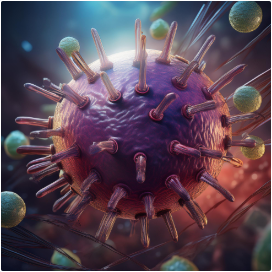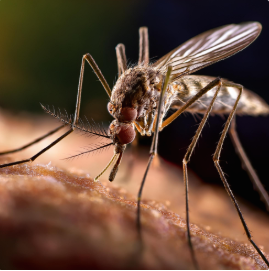West Nile Virus and Other Diseases

West Nile Virus
West Nile Virus (WNV) is a disease spread by infected mosquitoes, generally Culex Tarsalis (and occasionally Culex Pipiens) in Uintah County. It's a significant public health concern because it can cause illness, sometimes severe, and even death. Here's a breakdown:
- Mosquito-borne: WNV is primarily transmitted through the bite of an infected mosquito. These mosquitoes become infected by feeding on birds that carry the virus.
- Not person-to-person: WNV is not contagious from person to person. You can't get it by being near someone who has it.
- Most people don't get sick: About 80% of people infected with WNV don't develop any symptoms at all.
- Symptoms: When symptoms do occur, they usually include fever, headache, body aches, and sometimes a rash. These symptoms are generally mild.
- Severe illness: In less than 1% of cases, WNV can lead to serious neurological illness, such as encephalitis (brain inflammation) or meningitis (inflammation of the membranes around the brain and spinal cord). This can cause severe headache, stiff neck, confusion, seizures, and even death.
- Surveillance: Uintah Mosquito Abatement District (UMAD) along with the Health Department monitor mosquito populations and track cases of WNV to understand where and when outbreaks are likely to occur. This helps us implement targeted prevention measures.
- Prevention: Public health campaigns educate people about how to prevent mosquito bites (using repellent, eliminating standing water, etc.) to reduce the risk of WNV transmission.
- Mosquito control: UMAD's focus is to control and reduce mosquito populations, especially in areas with high risk of WNV.
- Vulnerable populations: Older adults (over 50) and people with weakened immune systems are at higher risk of developing severe WNV illness. Public health efforts often focus on protecting these groups.

Culex Tarsalis, Culex Pipiens, and WNV
- Culex tarsalis (Western Encephalitis Mosquito): This is the most widespread Culex mosquito in Utah. It thrives in agricultural and suburban areas near stagnant water sources like irrigation ponds. It's a major carrier of West Nile virus and Western equine encephalitis.
- Culex Pipiens (Northern House Mosquito): This species is common in urban areas, often found in storm drains and gutters. These mosquitoes can produce in stagnant water sources as small as a bottle cap. It is also known to transmit West Nile Virus.
Equine Vaccinations:
Vaccinating your horse against West Nile Virus is a vital step in ensuring their health and safety. It's a proactive measure that can prevent serious illness, reduce suffering, and provide peace of mind. Click + to read more.
General Recommendations:
- Primary Vaccination: If your horse has never been vaccinated for WNV before, they'll need a primary series of two doses. These are typically given 3-6 weeks apart (check the specific vaccine label).
- Annual Booster: Most horses need an annual booster vaccination to maintain protection. This is ideally done in the spring, before mosquito season really kicks in.
Timing Considerations:
- Mosquito Season: The most important factor is the timing of mosquito activity in your area. Vaccinate your horse before peak mosquito season, which is usually mid-summer. This allows them to build immunity before they're at the highest risk of exposure.
- Pregnant Mares: Pregnant mares can be vaccinated, but it's best to discuss the timing with your vet. Some vets recommend a booster 4-6 weeks before foaling to provide some initial protection to the foal.
- Foals: Foals from vaccinated mares may have some initial immunity from their mother's milk. The primary vaccination series for foals usually starts around 3-6 months of age, with boosters as they get older.
Why Timing Matters:
- Immunity Takes Time: It takes a couple of weeks after the second dose of the primary series for your horse to develop good immunity.
- Protection Before Exposure: You want your horse to have strong protection in place before they're likely to encounter infected mosquitoes.
Important Notes:
- Veterinarian is Key: Always work with your veterinarian to create a vaccination plan that's right for your horse and your area. They can consider factors like your horse's age, health, and risk of exposure.
- Vaccine Labels: Always follow the specific instructions on the vaccine label for dosage and timing.
- Other Prevention: Vaccination is important, but it's also good to use other mosquito prevention methods, like eliminating standing water and using insect repellent designed for horses.
Utah West Nile Virus Report
Utah Department of Health and Human Services tracks the activity of West Nile virus throughout the state. You can click on the link above to visit their website for information for the state.

